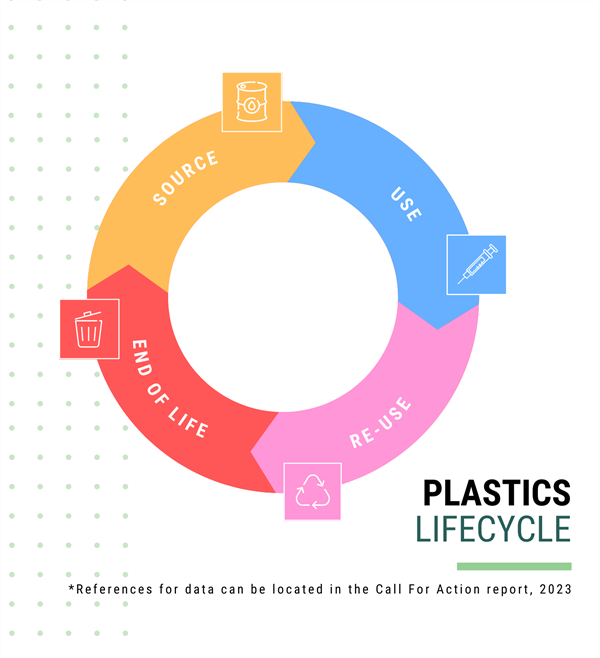We are an interdisciplinary team of over 60 researchers, working together to shape the fate and sustainable future of plastics.
An introduction to the Birmingham Plastics Network
Challenge
Since plastic became widely commercialised in the mid-20th century, the world has produced over 10 billion tonnes and thrown away almost 8 billion tonnes. Of the plastic in the UK, 37% has been sent for recycling, 44% incinerated for energy recovery, and 19% has gone to landfill.
While over the last 50 years plastic’s high performance, low cost, lightweight nature and durability has solved many problems but, in doing so, it has contributed to many serious environmental crises. To date, we have only scratched the surface in our understanding of the scale of the potential impacts and dangers of plastic particles within our environment.
Despite being essential components of our lives, we face growing pressures to create a plastic-free world, but this may not be realistic.
Vision
In an ideal world, plastics would perform their functions at reasonable energy and financial cost; emit little or no CO2 during their entire lifecycle; inflict no health or environmental damage if they escaped into the environment; and be capable of sustainable recycling at the end of their useful lives. However, initial research shows that we are unlikely to be able to have our cake and eat it – difficult decisions and compromises will need to be found.
The Birmingham Plastics Network aims to create a sustainable future for plastics that enhances the positive contributions they make to our social, economic and environmental well-being whilst minimising the negative impacts across their life cycle. In turn, plastics would be compatible with the UN’s Sustainable Development Goals.
Mission
Plastics is one of the largest challenges we face today, yet many solutions provided to date have been ‘quick-fix’ in nature, largely focussing on eradicating plastic in its entirety. Whilst these solutions are well meaning, they lack the nuanced insight into the wide-ranging use of plastic in our everyday lives and the breadth of positive and negative impacts associated with this.
This unique team brings together chemists, environmental scientists, philosophers, linguists, economists, artists, writers, lawyers, and experts in many other fields, to address the global plastics waste problem in its entirety.
We will engage with the plastics waste problem comprehensively, utilising interdisciplinary methods of research to ensure and enable widespread impact, considering economic, environmental, social and ecological impacts, and ultimately creating innovative solutions to an issue which has seen the same low-impact solutions and challenges be presented for decades.
Plastic: a call to action report
Published in January 2023, our latest report outlines the whole systems approach required to achieve a sustainable future for plastic.
Read the report
Our plastics research
- Development of sustainable polymers
- Policy for sustainable plastics and associated terminology
- Sustainable methods for the recycling and re-use of plastics
- Environmental impacts of end-of-life solutions
- Development of new degradable Biomaterials
- Corporate responsibility and business models
- Consumer responsibility; public perceptions and expectations
Our network
As well as our lead researchers, we have a broader network of academics across the University who are supporting our work.
You can learn more out more about our academics on our Birmingham Plastics Network Team page.
The plastics lifecycle

Source
The materials for most plastic today are supplied as a by-product of producing refined fuels from crude oil and natural gas. As the world transitions away from using fossil fuels for energy, where will the raw materials for plastic come from in the future? In principle, any plastic currently made from oil or gas could also be made from plant material. So, should we be replacing fossil-based feedstocks with those that are based on biomass? What are the alternatives?
Use
With all the publicity around plastic pollution, it is easy to forget how many benefits plastic has produced. Plastic has long protected lives in medicine, and in infrastructure: plastic pipes eliminate the risk of contaminated drinking water posed by lead ones. More generally, plastic has made products lighter, often more durable, and cheaper than they would otherwise be. How can one replace such a versatile substance? We need to think about where plastic is strictly necessary and where it is not. We need to find a way to distinguish between the products for which plastic is vital and those that use it simply because it is cheap.
Reuse
The plastics lifecycle could be long or short, depending on how reusable (and recyclable) the plastic in question is, but this is not often clear to the public. In the UK, there is broad public enthusiasm for more efficient forms of recycling which are easier to understand or undertake. Shockingly, of the almost 8 billion tonnes of plastic waste discarded to date, only 9% has been recycled. Even today, only 20% of plastics worldwide is recycled compared to 80% for steel. But even if all plastic was recycled, there are significant drawbacks with existing technologies that must be addressed.
End of life
Landfill causes 11% of global methane emissions, and Energy from Waste (EfW) emits large amounts of CO2 , particularly where, as in Britain, EfW waste heat is not generally exploited. In any case, neither approach is circular or sustainable. And none of this solves the carbon emissions of producing plastic. Perhaps there is no single solution. Since plastic performs many different functions and has widely differing properties, it makes sense that end of life pathways should differ too, but we’re a long way from the answer.
A joined-up approach
No one organisation or country can do this on their own. Any pathways or solutions need to be collective and systematic in approach, bringing together organisations with different priorities and purpose around the shared common purpose of creating and maintaining systems of sustainable plastic production, consumption and re-use.
Contact us
For any enquiries please contact plasticsnetwork@contacts.bham.ac.uk.